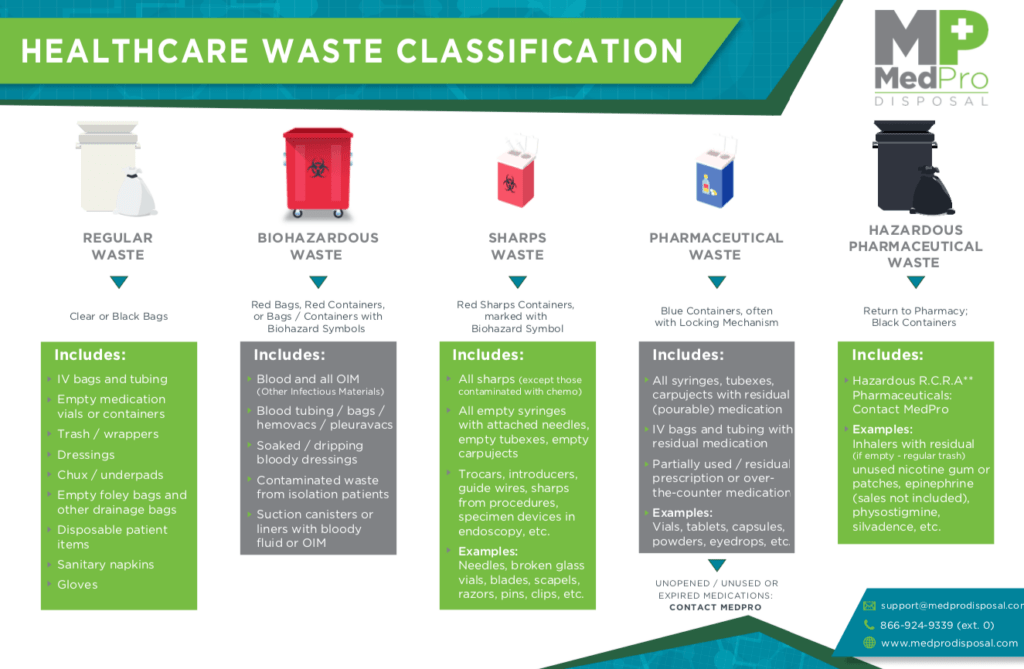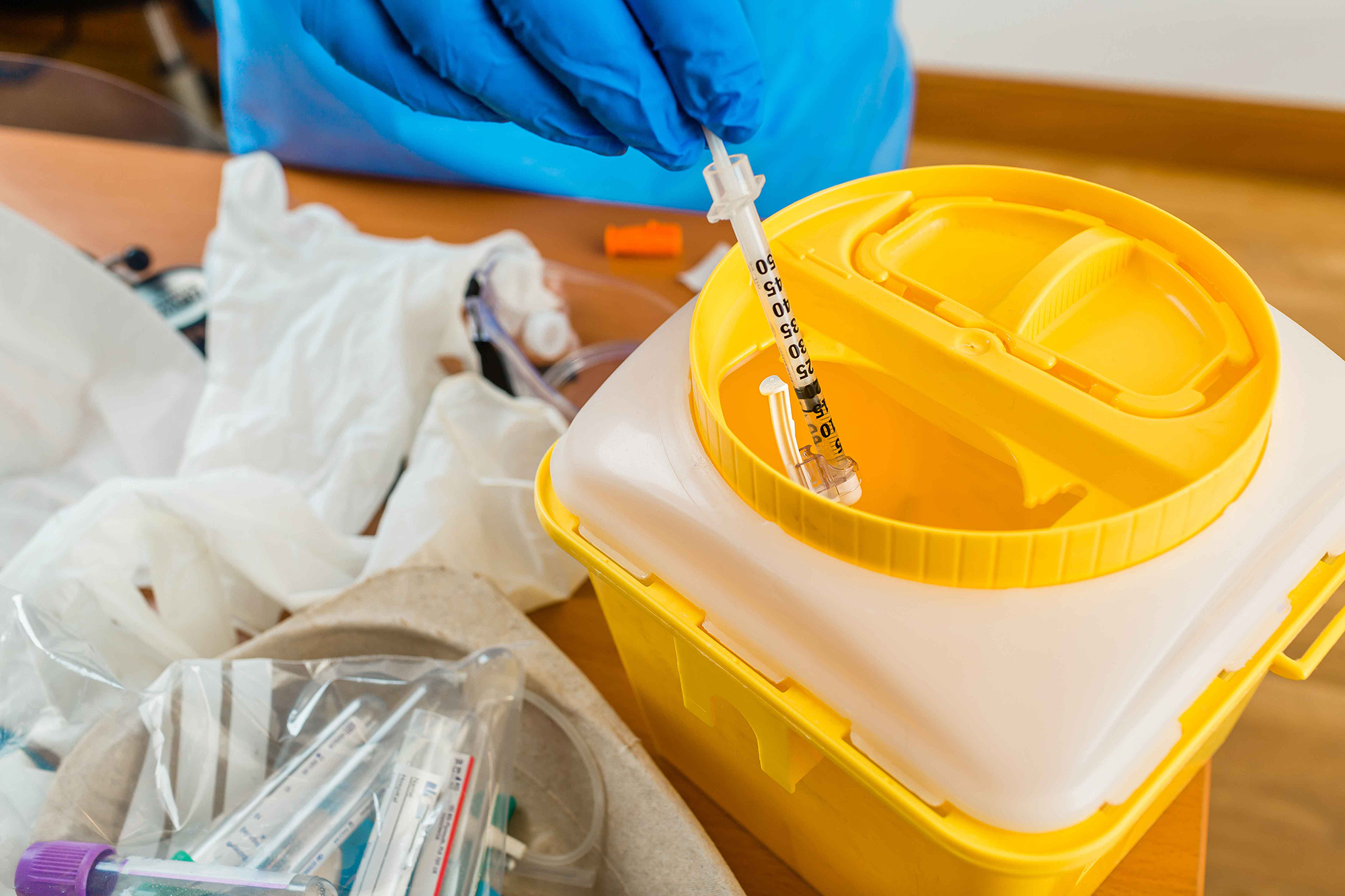Safe and Reliable Medical Waste Removal: Your Trusted Environmental Companion
Making Sure Safe Handling and Disposal of Medical Waste
Making certain secure handling and disposal of medical waste is of vital significance in health care settings. Incorrect monitoring of clinical waste can pose considerable dangers to the atmosphere, public health, and healthcare workers. In this intro, we will certainly check out the significance of proper medical waste monitoring, the risks associated with incorrect handling and disposal, as well as the standards and approaches that can be executed to ensure its secure disposal.
Value of Proper Medical Waste Management
Proper medical waste management is of utmost significance in ensuring the safety and security and well-being of medical care specialists, patients, and the general public. Clinical waste refers to any waste produced by medical care centers throughout the medical diagnosis, treatment, or booster shot of animals or people. This waste can position serious wellness threats if not managed and gotten rid of correctly.
Among the primary reasons why proper clinical waste administration is essential is to avoid the spread of infectious conditions. Clinical waste, such as utilized needles, contaminated dressings, and organic products, can lug hazardous virus. If not taken care of and disposed of properly, these pathogens can be sent to health care employees, people, waste trainers, and even the public, resulting in the possible episode of conditions.
Additionally, proper clinical waste administration helps shield the environment - medical waste disposal service. Medical waste includes unsafe materials, including chemicals, drugs, and contaminated compounds. When not managed properly, these materials can infect dirt, water bodies, and the air, posing a considerable danger to ecosystems and public health and wellness
Moreover, efficient clinical waste administration makes sure conformity with neighborhood regulations and international criteria. Governments and regulative bodies have actually established protocols and standards to make sure the secure handling, storage space, transportation, and disposal of medical waste. Adhering to these laws is important to avoid lawful effects and preserve the reputation and reliability of health care facilities.
Dangers of Improper Handling and Disposal

Individuals can also be revealed to these contagious illness if clinical waste is not effectively taken care of. If polluted needles or various other sharps are not disposed of in designated puncture-proof containers, they might inadvertently puncture patients, leading to prospective infections. Moreover, if clinical waste is not segregated correctly, there is a threat of cross-contamination in between various kinds of waste, further increasing the chances of illness transmission.
Inappropriate disposal of medical waste can likewise have damaging impacts on the environment and the general public. If medical waste is not dealt with and thrown away appropriately, it can infect water resources, soil, and air, causing the spread of conditions and contaminants. This can have lasting repercussions on environments and public health.
Standards for Safe Handling of Medical Waste
Executing reliable procedures for the safe handling of clinical waste is crucial in making certain the security of healthcare specialists, clients, and the general public. These standards are vital in lessening the risks linked with the handling and disposal of medical waste, such as infections, injuries, and environmental air pollution.
Firstly, health care facilities have to develop a thorough waste administration plan that sticks to neighborhood, nationwide, and global regulations. This strategy must consist of clear directions on waste segregation, packaging, transport, labeling, and storage space. It is crucial to separate various sorts of waste, such as sharps, contagious products, pharmaceuticals, and non-hazardous waste, to stop cross-contamination and promote risk-free disposal.
Furthermore, medical care workers must receive complete training on appropriate waste handling methods. They ought to be informed on the prospective risks of clinical waste, the proper use personal protective equipment (PPE), and the correct procedures for handling, delivering, and taking care of various sorts of waste.
Furthermore, healthcare facilities ought to consistently monitor and audit their waste management methods to make sure conformity with guidelines. This consists of performing normal inspections, evaluating waste handling procedures, and supplying responses and training to personnel.
Effective Strategies for Waste Disposal
To make certain the safe handling and disposal of medical waste, it is vital to employ reliable approaches for garbage disposal. Clinical waste can posture substantial risks to public health and the atmosphere otherwise taken care of and thrown away appropriately. Medical care facilities and waste management organizations should implement suitable strategies to mitigate these dangers.
It involves dividing various types of clinical waste based on their qualities. Medical care facilities need to offer clear standards and training to team members on exactly how to segregate waste appropriately.

Furthermore, health care centers ought to team up with accredited waste management business to make certain appropriate disposal of medical waste. These companies have the expertise and equipment called for to safely dispose and manage of clinical waste in conformity with laws and ideal techniques.
Training and Education And Learning for Health Care Professionals
Health care experts play a critical duty in ensuring the safe handling and disposal of medical waste through extensive training and education. It is necessary for healthcare companies to have a deep understanding of the prospective dangers related to clinical waste and the proper protocols for its monitoring. By getting correct training, health care specialists can minimize the prospective transmission of infectious conditions, prevent environmental contamination, and protect both themselves and the basic public.

In addition, training programs must highlight making use of personal protective equipment (PPE) and appropriate hand health practices when taking care of medical waste. medical waste disposal. Medical care professionals ought to understand just how to correctly utilize and get rid of of PPE to secure themselves from possible exposure to dangerous products. They need to also be informed on the relevance of normal handwashing and the appropriate use hand sanitizers to reduce the spread of transmittable diseases
Proceeding education and learning and routine updates on medical waste administration practices are important for healthcare professionals. As laws and guidelines advance, it is important to maintain doctor notified concerning any kind of changes in procedures and ideal techniques. This will make sure that they remain up-to-date and preserve a high requirement of safety in managing and getting rid of of medical waste.
Final Thought
Finally, appropriate handling and disposal of clinical waste is critical to ensure the security of health care experts, people, and the setting. Neglecting to follow guidelines and policies can result in different dangers and dangers. Executing efficient methods for garbage disposal and providing appropriate training and education for healthcare specialists are important in maintaining a secure healthcare environment. By adhering to these techniques, we can reduce the possible threats connected with medical waste.
Clinical waste refers to any type of waste created by health blog care facilities throughout the diagnosis, therapy, or immunization of pets or people. If medical waste is not set apart correctly, there is a threat of cross-contamination in between different kinds of waste, further increasing the possibilities of illness transmission.
It is important to separate various types of waste, such as sharps, infectious products, pharmaceuticals, and non-hazardous waste, to protect against cross-contamination and advertise secure disposal. WasteX Medical Waste Disposal.
To make sure the safe handling and disposal of clinical waste, it is important to use efficient techniques for waste disposal. In addition, health care centers must establish a normal waste collection and transportation routine to prevent waste accumulation and minimize the danger of crashes or contamination.